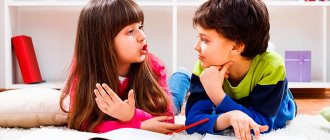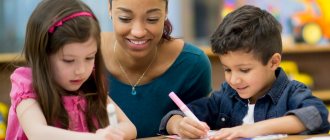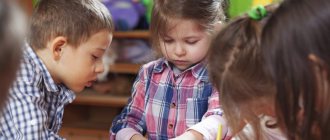The elements of effective communication include
- desire to interact with others;
- the ability to organize communication - listen to the interlocutor, empathize emotionally, resolve conflict situations;
- knowledge of the norms and rules that must be followed when communicating with others.
The implementation of the tasks of social and communicative development of preschool children is aimed at gaining experience in various types of children's activities .
- Playful activities make the child feel like an equal member of human society. In the game, the child gains confidence in his own abilities, in the ability to get real results.
- Research activity allows the child to independently find a solution or refutation of his own ideas.
- Fine - allows the child, with the help of work and imagination, to get used to the world of adults, get to know it and take part in it.
- Subject-based – satisfies the child’s cognitive interests at a certain period, helps to navigate the world around him.
- Observation enriches the child’s experience, stimulates the development of cognitive interests, gives rise to and strengthens social feelings.
- Communicative (communication) – unites an adult and a child, satisfies the child’s various needs for emotional closeness with an adult, for his support and evaluation.
- Project - activates the child’s independent activity, ensures the unification and integration of different types of activities.
- Constructive – makes it possible to form complex mental actions, creative imagination, and mechanisms for managing one’s own behavior.
Thus, each type of activity contributes to the process of social and communicative development of preschool children.
The specificity of preschool age is that the social development of a child is carried out under the influence of an adult who introduces the child into society. The child cooperates with competent adults; as a member of society, he is included in the system of human relations, where a dialogue of personalities and value systems takes place. The development of patterns and norms of behavior and the search for correct life attitudes occurs in preschoolers in interaction with peers, teachers, and parents.
Before starting classes on the development of communication skills, as well as subsequently, it is important for teachers to diagnose the communicative development of preschoolers. It consists of conducting a conversation with children, observing them as they complete a task, using preschool didactic material. Communicative development is assessed according to three criteria:
- The child’s knowledge of the rules of communication with people.
- How willingly the child communicates.
- The extent to which a child can listen, resolve conflict situations, and how empathic he is.
Each of these three criteria is assessed using a point system, and as a result, communicative development is assessed at one of three levels: high, low or average.
Children aged 2-3 years are just beginning to master communication skills. A good activity option for them would be to role-play a situation involving going on a visit .
Topic: “To the bunny’s birthday.”
Goal: familiarization with the rules and norms established in society.
Equipment: laptop; loudspeakers; recording a song; toy car; bunny toy; toy gift.
“Communicative activity of preschool children in direct educational activities”
Author: Braitsara Oksana Alekseevna
The success of the development of communicative activity in preschoolers depends on the degree of productivity of the process of consolidating speech skills and abilities acquired in classes throughout the day.
The leading form of organizing the education of preschool children is direct educational activities, which are implemented through the organization of various types of children's activities: play, motor, communicative, cognitive-research, etc. In accordance with the Federal State Educational Standard, direct educational activities, consisting of five educational areas: cognitive development, speech development, social and communicative development, artistic and aesthetic development, physical development, must be integrated, that is, it must include all educational areas.
ECD is aimed at children mastering one or more educational areas, or their integration using a variety of forms and methods of work, the choice of which is carried out by us independently.
To work with children, we often use subgroup and individual forms of training.
Children's educational activities should be interesting and entertaining. Lexical topics are varied and rich in information. With the help of educational activities, the following tasks were solved: to develop children’s communication skills, to form knowledge, to develop cognitive activity, interest in the subjects around us; develop creative abilities; develop the ability to perform teamwork; develop speech, expand vocabulary.
In this way, an integrated educational activity with different forms of work is obtained, during which all children are happy to join the process, communicate, play, design, dance, engage in creativity, and get acquainted with new terms.
The development of communication skills is a priority basis for ensuring the continuity of preschool and primary general education, a necessary condition for the success of educational activities and the most important direction of social and personal development.
Through communication, the development of consciousness and higher mental functions occurs. A child’s ability to communicate positively allows him to live comfortably in the company of people; Thanks to communication, a child not only gets to know another person, but also himself. Regardless of his personality type, a child needs help to communicate with the outside world. The environment is rewarding and exciting, but without communication skills its benefits are difficult to appreciate.
Teachers in preschool educational institutions should create all conditions that promote a positive attitude in children, which leads to the need for children to be able to communicate with each other.
Sociability and the ability to communicate with other people are a necessary component of a person’s self-realization and success in various types of activities. comments powered by HyperComments
Problems of development of communication in modern children
But the main task of preschool communicative development is to awaken in the child the desire to communicate.
As you know, communication is the most important need of a person, without which he ceases to be a person; It is the ability to interact with each other that is the peculiarity of human civilization. Without communication, it is impossible to communicate socially, to find your place and purpose in life. This is the foundational activity for all other activities.
Play and communicative development are interconnected
The concept of effective communication consists of 4 components:
- desire to interact with people around you;
- know the norms and rules of behavior, perceive social roles in society;
- be able to communicate, listen, perceive emotions, conscious and unconscious signals from other people;
- resolve any conflicts in communication.
Despite the fact that all this seems quite natural, in the modern world the number of young children with problems in the development of communication skills is increasing.
Speech therapy games will help improve speech communication
This leads to the fact that the behavior of preschoolers becomes increasingly unbalanced: they are unable to take control of their emotions, communicate normally with peers, master speech, etc. All this, of course, affects the development of intellectual abilities and leads to a frightening lag in the normal development of all greater percentage of children.
MAGAZINE Preschooler.RF
Social and communicative development of preschool children through project activities“A child by nature is an inquisitive explorer, a discoverer of the world
So let a wonderful world open before him in living colors, bright and vibrant sounds, in a fairy tale, in a game, in his own creativity, in beauty. Through a fairy tale, a game, through unique children’s creativity - the right path to a child’s heart.”
V.A. Sukhomlinsky.
In modern conditions of social development, changes in the socio-economic sphere, culture and education, the issues of education, training and development of the younger generation are of particular importance. Today, preschool education in Russia is rightfully recognized as the initial link in the system of continuous general education.
In the Federal State Educational Standard for Preschool Education, much attention is paid to preserving the uniqueness and intrinsic value of childhood as an important stage in the overall development of a person; The emphasis is placed on the development of the child’s personality, socialization, and the disclosure of his potential capabilities and abilities.
In this regard, the main range of tasks of modern preschool educational organizations is shifting to creating conditions under which children fully develop, mastering the stage of preschool childhood, and move to the next level motivated to receive education at school. One of the priority areas of education for children of senior preschool age, which reflects the social order of society and the family, according to the Federal State Educational Standard for Education, is their social and communicative development.
Many preschoolers experience serious difficulties in communicating with others, especially with peers. Some children do not know how to address another person on their own initiative; sometimes they are even embarrassed to respond appropriately if someone addresses them. They cannot maintain and develop established contact, adequately express their sympathy and empathy, and therefore often conflict or become isolated.
A child’s mastery of culture and universal human experience is impossible without interaction and communication with other people. And a child’s ability to communicate positively allows him to live comfortably among people. Thanks to communication, he not only gets to know another person, be it an adult or a peer, but also gets to know himself more and more.
The relevance of the social and communicative development of preschool children is increasing in modern conditions due to the characteristics of the child’s social environment, in which there is often a lack of good manners, kindness, goodwill, and speech culture in relationships between people. Teachers of preschool educational organizations are concerned about changes in the moral, social and communicative development of children, and their behavior. The problem of introducing a child to the social world, developing his ability to adequately navigate an accessible social environment, realize the intrinsic value of his own personality and other people, express feelings and attitudes towards the world in accordance with the cultural traditions of society at the present stage of social development remains one of the leading ones.
What is social and communicative development? This is a complex process during which a child learns the values, traditions, culture of the society or community in which he will live.
Social and communicative development is implemented in several directions:
- Development of gaming activities
- Patriotic education
- Formation of the foundations of safe behavior in everyday life, society, and nature.
- Labor education
We would like to share our experience in integrating pedagogical initiatives to implement a program of socio-communicative development and social education of preschool children through patriotic development.
The problem of patriotic education of the younger generation is one of the most pressing today. Patriotic education of preschoolers is not only about instilling love for one’s home, kindergarten, city, native nature, the cultural heritage of one’s people, one’s nation, and a tolerant attitude towards representatives of other nationalities. But also fostering a respectful attitude towards the worker and the results of his work, his native land, defenders of the Fatherland, state symbols, state traditions and national holidays.
It is very important that children understand as early as possible that the big Motherland is Russia, the Russian Federation, it is one for everyone who was born in its vastness, who loved it, who makes efforts to make it even more beautiful, richer, and become a powerful power. And each of us needs to be able to be useful to her. And for this you need to know and be able to do a lot; From childhood, do things that would be for the benefit of your home, kindergarten, city, and in the future - for the benefit of the whole country. If a person cares about the Motherland, it means that he is its son, and that means Russia is the Motherland for him.
The child cannot organize such activities independently. An adult should help him using new modern technologies. This technology is design technology, which is based on participation in activity. The use of design technology makes it possible to develop search behavior that is relevant for a person and allows the teacher to make the first contribution to the culture of the individual: cooperation, creation, dialogue, friendship, tolerance - components of the “culture of peace” . The project method will allow you to take into account one of the main principles - the principle of integration: combining several types of activities.
In the course of joint work with children on a project, adults help introduce the child to culture: children master positive patterns of behavior in nature and society; acquire a positive and responsible attitude towards themselves, others, and nature; children receive the right to self-development.
Therefore, one of the main means of patriotic education in preschool educational institutions is the project method. Based on a personality-oriented approach to teaching and raising children of senior preschool age, he develops cognitive interest in various areas of knowledge, develops cooperation skills; opens up great opportunities in organizing joint search activities of preschoolers, teachers, and parents.
The teachers of our preschool institution developed a long-term project “Little Patriots” . The project is designed for children of senior preschool age.
Objective of the project:
- Formation of patriotic qualities of a child’s personality through introducing children to family traditions and values.
- Raising a citizen and patriot of his country, who loves his family, home, and people close to him.
- Developing the ability to work in a team and collaborate.
We worked on the project for 6 months. The project includes 4 thematic blocks.
- block – “My family”
- block – “Green Street”
- block - “I love you, city of Yekaterinburg” .
- block – “Victory Day”
Let's take a closer look.
Block 1 - “My Family”
The love of a small preschool child for the Motherland begins with the relationship with the closest people - father, mother, grandfather, grandmother. For a child, a family is a world in which the foundations of morality and attitude towards people are laid. Family members are united by blood, love, common interests, traditions, and holidays. It is in the family that such concepts as “compassion” , “mercy” , “kindness” , “masculinity” , “femininity” , “cohesion” , “unity” , “helping others” , “respect for elders” , “feeling responsibility .
To interest children in studying this topic, we held fascinating conversations and trainings on the topics: “My friendly family” , “Tell me about your family” , “ My household responsibilities” , “If mom is tired” , etc.
The children were very interested in the topic; everyone wanted to tell as much as possible about their family, and for this they, together with their parents, created video presentations and organized a photo exhibition “Our Family Vacation” .
Parents responded to all the proposed tasks related to project activities, took up the work with interest, everyone contributed interesting ideas,
Almost no family was left behind.
The children with great love made various crafts with their own hands, both from paper and from available materials: “Gift for Mom” , “Rug for the House” ; willingly sculpted, constructed from building materials and Legos, and actively took part in the “A Home for My Family” .
The final event for working on the theme “My Family” was the holiday “Inseparable Friends are My Whole Family .
Block 2 – “Green Street”
The feeling of love for one’s native nature is another component of patriotism. It is by nurturing a love for nature that one can develop the patriotic feeling of preschoolers: after all, natural phenomena and objects surrounding the child are closer to him and easier for him to perceive, and have a stronger impact on the emotional sphere. Trying to instill in children a love for all living things, we, together with our parents, carried out various forms of work, such as: the campaign “Clean up the Planet” , “A Cozy Home for the Starling” , “Animal Food” , Operation “Sprout” , within the framework of which, We were planting trees, shrubs, and flowers. We organized a “Nature Corner” We held competitions, “Best Flowerbed” , “Miracles in the Garden” , and a photo competition “Portraits of Wildlife” .
The result of the work on the “Green Street” was a generalization of our knowledge and participation in the “Ecological Path” .
Our work allowed us to expand children's knowledge about the nature of their native land, taught children to work in a team and respect each other. The children received answers to their questions and made recommendations for the residents of our city “How to preserve and decorate our planet”
Block 3 - “I love you, city of Yekaterinburg” .
Each person has his own small homeland. Most often, the favorite city is the place where a person was born and raised. To form the foundations of civic culture and social and moral development in children, it is necessary for children to acquire knowledge about their hometown.
Without sufficient knowledge, it is difficult to form in a child a respectful attitude towards the Motherland. Childhood memories are the most vivid and exciting. The more a child knows from childhood about his native places, his hometown, the closer and dearer his homeland, Russia, will become to him.
As part of this topic, together with the music director, we held conversations with children on the topic “I was born here!” , “We are proud of you, our native city ,” formed the children’s knowledge about the sights of the city, memorable places, we were able to visit some of these places. We designed a photo collage on the theme “I love you, city of Yekaterinburg .
Together with the physical education teacher, the children took part in the quest game “On the City Streets” .
A survey was conducted for parents : “Do you know your city?” , developed reminders “Famous people about love for the Motherland” , “A citizen is raised from childhood” .
We created an excursion and tourist route “Our City for Children”
The result of the work in this section was a generalization of our knowledge and participation in the musical festival “City of Miracles” .
Block 4 - “Victory Day”
Every year, fewer and fewer veterans of the Great Patriotic War remain alive. We, the current generation, are obliged to remember those who forged Victory at the fronts and worked in the rear. It is the direct responsibility of adults to help preserve the memory of the heroic facts of our history, to instill in young citizens pride in their Motherland, and to nourish the receptive soul of a child with sublime human values.
We adults have the task of expanding the social competence of children in matters of social significance of the national holiday of Victory Day within the boundaries accessible to children, emphasizing the importance of introducing preschoolers to the fact that war is always a tragedy and grief for people. At the same time, it is important for children to learn to admire the courage and heroism of the people who defended their Homeland; experience your involvement with distant events of history, feel the joy of the Great Victory, pride in your Fatherland.
This topic is loved by children. Heroism, courage, readiness to perform feats in the name of the Motherland - these traits of a Russian warrior are understandable to older preschoolers; they evoke respect and a desire to be just as courageous and brave. The project includes a number of activities aimed at the search and research activities of preschool children and the development of communication skills and abilities. We visited the “Museum of Military Equipment” in the city of Verkhnyaya Pyshma and laid flowers at the Great Patriotic War Memorial. Children and their parents are happy to take part in the “Immortal Regiment” , and I am proud to talk about veterans.
Having teamed up with other groups, in our kindergarten we organized an exhibition “Thank you for the victory,” which included photographs of the war years, military uniforms, photo albums of brothers, fathers, grandfathers, great-grandfathers who served in the armed forces of the Soviet and Russian armies, children “Victory Day” postcards .
We listen with interest to songs on military themes, they are easy to remember, their content is in tune with the desires of the children to be strong and brave defenders of our Motherland. Children and parents took an active part in the patriotic song competition “The song saved us in the trenches .
The result of the work on this section is the publication of the newspaper “We brought this day closer as best we could...” and the musical festival “Happy Victory Day!”
To summarize, I would like to note that the main task of a modern preschool educational organization is to ensure that pupils emerge from its walls not only with a certain stock of knowledge, abilities and skills, but also with a certain set of moral qualities necessary for later life, mastering social, ethical standards of behavior. It is important to develop in preschoolers the ability to build relationships with others on the basis of cooperation and mutual understanding, to ensure general mental development, to form the prerequisites for educational activities and the qualities necessary for social adaptation, including school learning.
As a result of using project activities, children became more liberated and independent, purposeful and self-confident, sociable, more attentive and caring towards peers and adults; capable of mutual understanding and cooperation.
| Next > |




